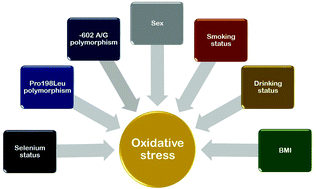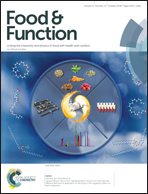The redox balance of healthy Brazilian adults is associated with GPX1 Pro198Leu and -602A/G polymorphisms, selenium status, and anthropometric and lifestyle parameters
Abstract
Purpose: Considering that oxidative stress is implicated in the pathogenesis and progression of different health conditions, we aimed to evaluate whether the redox balance of a healthy Brazilian population is associated with GPX1 polymorphisms, selenium status, lipid profile, and anthropometric and lifestyle parameters. Methods: 343 healthy adults were assessed for redox balance markers [glutathione peroxidase (GPx) and superoxide dismutase (SOD) activity; malondialdehyde (MDA) and oxygen radical absorption capacity (ORAC)]; genotyped for the polymorphisms GPX1 Pro198Leu (rs1050450), -602A/G (rs3811699) and Arg5Pro (rs8179169); evaluated for selenium biomarkers (plasma, erythrocyte, and urine) and intake; and assessed for lipid profile. Anthropometric (BMI) and lifestyle data (physical activity, current smoking habit and alcohol consumption) were collected. Multivariable regression models were applied to investigate the possible associations. Results: Although there were no differences in GPx activity according to GPX1 Pro198Leu and -602A/G polymorphisms, this redox balance marker was positively associated with erythrocyte selenium and negatively associated with the presence of a minor allele of Pro198Leu. SOD activity was positively associated with the presence of a minor allele for these polymorphisms. ORAC showed the same pattern among Leu and G carriers and was positively associated with Leu allele presence, BMI and alcohol intake. MDA was only associated negatively with the male sex and plasma selenium. Conclusions: Our findings suggest that the redox balance of a Brazilian healthy population is associated with GPX1 polymorphisms (Pro198Leu and -602A/G), selenium status, BMI, sex, smoking habit and alcohol consumption.



 Please wait while we load your content...
Please wait while we load your content...